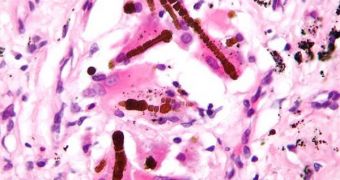A team of experts in the United States announces the development of a new type of virus that can selectively target and infect cancer cells, delivery drugs as it does so. The discovery could be used to treat several types of cancer, the team behind the research believes.
The research group managed to get the new agent to track down cancerous tumors exclusively by re-engineering the herpes virus in a way that makes it useful to humans. The new variant only targets cancerous cells, and can easily infect them.
At the same time, the viral agent also carried genetic material capable of triggering reactions that are damaging to the tumor cells. Furthermore, the material also forces the cells to produce a biomarker that makes them visible to other drugs.
While the virus will not necessarily be used as a means of treating cancer, it will provide oncologists with a way of detecting the condition in its infancy. At the same time, it will soon be possible to use this virus monitor the progress of other therapies used against the condition.
Details of the new research appear in the May 11 issue of the open-access journal PLoS ONE, which is edited by the Public Library of Science. The investigation was conducted by researchers at the Cincinnati Children’s Hospital Medical Center, Science Blog reports.
Thus far, the new approach has only been modeled in pre-clinical mouse models, but the team is convinced that it will be equally as effective in humans as well. What the re-engineered herpes virus does is it denies cancer its cover, the defense mechanism that makes it elusive.
Unlike existing diagnostics technologies, the new detection method comes cheap, and is also highly-portable. This means that it could even come in handy in the Third World, where access to modern medicine is limited and expensive.
“Our study represents a proof-of-principle in mice, and there is certainly room for further refinement. If ultimately validated in human trials, it could have implications for people with known cancer risk or who have a history of cancer and high risk of recurrence,” explains Timothy Cripe, MD, PhD.
“Early cancer detection is vital to improve cure rates because cancer stage predicts prognosis, but biomarkers are known for only a few cancer types,” adds the expert, who was the senior investigator of the new research.
“We were able to use a reprogrammed herpes virus administered intravenously to deliver genetic information that induces a known blood biomarker for cancer to be secreted by cancer cells,” he says.
Cripe, a physician and researcher at Cincinnati Children’s Division of Oncology, worked on this study with UC College of Medicine fourth-year medical student Andrew Browne, PhD. The latter is also a recent graduate from the UC Department of Electrical and Computer Engineering.

 14 DAY TRIAL //
14 DAY TRIAL //